Brain Mapping Foundation Turned Los Angeles into the Brain Capital of the World and will be holding its first World BRAIN Expo in 2019 in Los Angeles
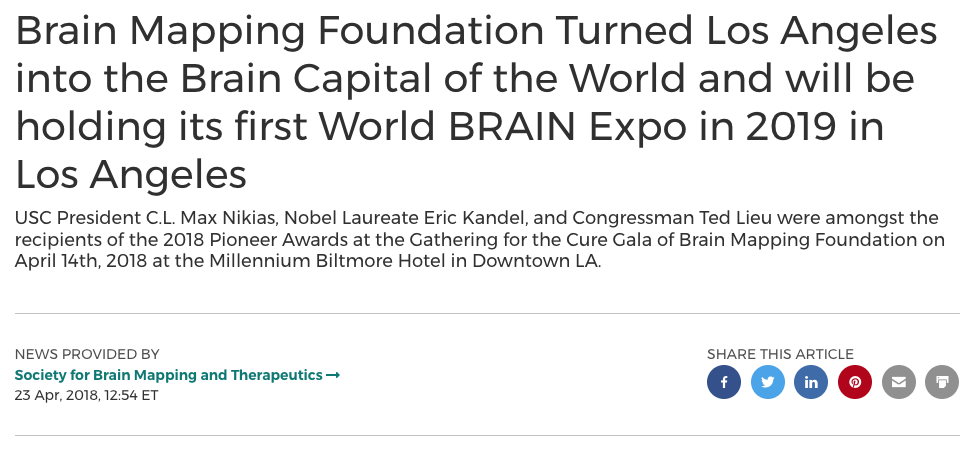
LOS ANGELES, April 23, 2018 /PRNewswire-USNewswire/ — 700+ World leading experts in brain/ spine mapping and therapeutics converged to Los Angeles last week at the 15th Annual World Congress of Society for Brain Mapping and Therapeutics (SBMT-April 13-15, 2018) in order to rapidly introduce new diagnostics and therapeutics for neurological disorders. This year, the program had 11 keynote speakers including: Drs. Eric Kandel (Nobel Laureate), Deepak Chopra, Walter Copan (Undersecretary for Commerce), Jennifer Fogarty (Chief Scientist NASA Human Research Program), Carl Cotman (professor of Neurology UCI), Rear Admiral Riggs (Director of Research and Development-Defense Health Agency), Kyu Rhee (Chief Medical Office of IBM Watson Health), Jeremy Richman (Avielle Foundation), Warren Boling (SBMT President 2017-2018, Chair of Neurosurgery, LLU), Cartier Esham (Executive Vice President for Emerging Companies at the Biotechnology Innovation Organization (BIO), and Congressman Ted Lieu. “This year, we focused our program on innovation, translation, integration, and commercialization of neuro-technologies to advance therapeutics for our patients” said, Dr. Vicky Yamamoto, Executive Director of SBMT and a member of the Executive Board of BMF and SBMT, and a cancer scientist at the Department of Head and Neck Surgery at USC-Keck School of Medicine. The convention had 400 world-renowned scientists as invited speakers covering latest diagnostics and therapeutics platforms for Alzheimer’s disease, Parkinson’s disease, ALS, brain cancer, military medicine (PTSD, Traumatic Brain and Spine Injury, Chronic Traumatic Encephalopathy.…), gene therapy, neuro-vascular disorders, radiation oncology, NeuroEngineering, stroke, epilepsy, multimodality imaging, and spinal disorders including a practical cadaver lab supported by Globus Medical and Marksman Instrument. UCLA Anderson School of Management faculty, George Abe, Professor and Director of the Strategic Management Research Program at UCLA Anderson School of Management and Tom Oser collaborated with Brain Mapping Foundation Brain Technology and Innovation Park (BTIP) and held series of sessions on Commercialization of Neuro-Technologies. “SBMT has made great impacts in the field scientifically not only through cross pollination of ideas and disciplines but also through enabling scientists to take their innovation to market.” Dr. Tom Oser, Visiting Professor of Management of Technology & Innovation at UCLA Anderson School of Management. “SBMT is an unparalleled network of experts, entrepreneurs, non-profit and government segments, that all appear to be intent on accelerating the adoption of neuroscience solutions,” he continued. The Brain Technology & Innovation Park (BTIP) is aimed at fostering global partnership amongst biotechnology parks, NASA, US Federal and national labs, industry, academic institutions, non-profit and venture philanthropy organizations in order to rapidly introduce diagnostics and therapeutics for neurological disorders. The BTIP Initiative will be facilitating commercialization of neuro-technologies through necessary funded research and product development phases. Members of the BTIP could additionally participate in our various symposium and workshops at the annual meetings of SBMT in Los Angeles. “BMF is committed to make Los Angeles the capital of the world for brain and neurotechnology in general; we are honored to have such amazing luminaries as our keynotes and honored to award pioneers in the field including Drs. Kandel, Nikias, Federoff and Congressman Ted Lieu”, said, Dr. Babak Kateb, Chairman of the Board and CEO of SBMT, President of BMF and Director of Brain Technology and Innovation Park (BTIP). Three screenings of an award-winning documentary on epilepsy, Brainstorm, were aired at the SBMT World Congress, and discussions were held on the topic by leading experts Drs. Warren Boling (LLU) and Dawn Eliashiv (UCLA). The documentary was produced by Ms. Stacia Kalinowski who had documented her own struggle with epilepsy; this documentary was well received by epilepsy patients and their families and caregivers. “SBMT is not only focused on advancing the science in the field but also insuring epilepsy patients access to the latest clinical trials and therapeutics available through our collaborating centers of excellence” Dr. Dawn Eliashiv, a member of the board of SBMT, Professor of Neurology and Co-director of the UCLA Seizure Disorder Center. SBMT’s slogan is “breaking boundaries of science, medicine, technology, art, and healthcare policy”. This year, the foundation awarded many outstanding individuals including C. L. Max Nikias, USC President with Humanitarian Award for his global contributions to science, technology, art, and policy. “I congratulate Dr. Max Nikias for this great honor, applaud and support amazing work done by the Brain Mapping Foundation including many of their initiatives” said Ming Hsieh, Founder and CEO of Fulgent Genetics, Inc., a member of the USC Board of Trustee and 2013 recipient of the BMF-SBMT Humanitarian award. The 2018 award winners were: USC President Dr. C. L. Max Nikias, recipient of the Humanitarian Award; Dr. Jeremy Richman, recipient of the Beacon of Courage and Dedication Award; Nobel Laureate Dr. Eric Richard Kandel, Former UCI Vice Chancellor Dr. Howard Federoff and Dr. Jonathan Kipnis, recipients of the Pioneer in Medicine Award; US Congressman Ted W. Lieu, recipient of the Pioneer in Healthcare Policy Award; United Neuroscience Co-founder Lou Reese, United Neuroscience Co-Founder Mei Mei Hu, United Neuroscience Co-Founder Dr. Chang Yi Wang and Dr. Bahram Jalali, recipients of the Pioneer in Technology Award; Dr. Warren Boling, recipient of the Golden Axon Leadership Award; and Drs. Dong Song and Wonhye Lee, recipients of the Young Investigator Award. “We continue to grow over the last 15 years and expand the outreach of the foundation beyond helping the wounded soldiers and veterans in order to impact soldiers, veterans and civilians with neurological disorders, spine disorders, and injuries, and they are critical to our mission,” said, Dr. Ken Green, Ret. US Navy Commander, Vice President of Brain Mapping Foundation, and a member of the executive board of SBMT. The 2018 event was supported by: Department of Commerce, Department of Defense, NIH, NASA/International Space Station, United Neuroscience, Bedside Viewer, Institute for Nerve Medicine/ Neurography, French Telethon, Eisai Pharmaceutical, Carl Zeiss Meditec Inc, IBM Watson Health, Medtronic Inc, Stryker, Globus Medical, Siemens, AML-Hong Kong, Olympus, Ad-Tech, Ricoh, Marksman, Fulgent Genetics, Neural Analytics and many more biotech and startups. 2019 World Brain and Spine Mapping and Therapeutics will be held at the LA Convention Center along with the world’s first World BRAIN EXPO on March 15-17th 2019. “2019 World Congress of Brain Mapping & Therapeutics will also include significant innovation in spine diagnostics and therapeutics” said, Dr. Jeffrey Wang, Co-director of USC Spine Center, Professor of Clinical Orthopedic Surgery and Neurosurgery (Clinical Scholar), and the 16th President of SBMT and a member of the Executive board of SBMT. About SBMT: www.WorldBrainMapping.Org About BMF: www.BrainMappingFoundation.Org Media Contacts: Dr. Ken Green Ken.Green@WorldBrainMapping.Org 202.577.5105 SOURCE Society for Brain Mapping and Therapeutics Related Links https://www.worldbrainmapping.org
Nikias honor reflects USC’s investment in brain mapping, bioscience
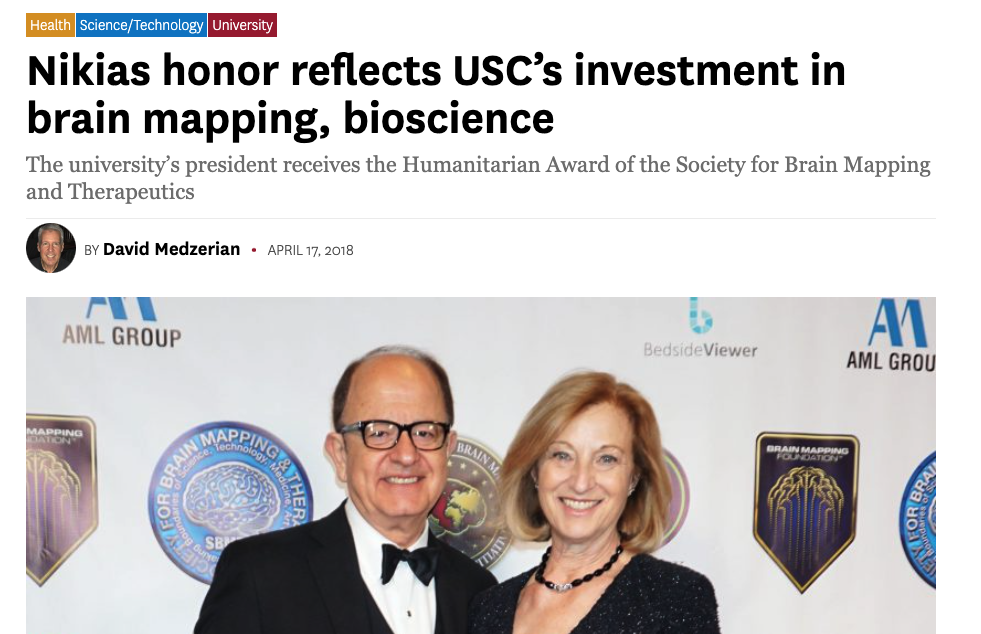
The university’s president receives the Humanitarian Award of the Society for Brain Mapping and Therapeutics USC President C. L. Max Nikias was honored April 14 with the Humanitarian Award of the Society for Brain Mapping and Therapeutics. The award is presented to physicians and scientists who have made significant contributions to survival and quality of life of patients across the globe. “It’s a tremendous honor to accept this award on behalf of the university,” said Nikias, emphasizing the priority USC has given to this important discipline. We have made significant investments and multidisciplinary appointments to advance our capabilities in brain mapping, neuroscience and the biosciences more broadly. C. L. Max Nikias “Because of the potential to improve the lives of so many people around the world, we have made significant investments and multidisciplinary appointments to advance our capabilities in brain mapping, neuroscience and the biosciences more broadly.” Leader in brain mapping USC has emerged as a leader in brain mapping, a field that straddles biological science and engineering and brings improved measurements to clinical treatments for diseases such as Alzheimer’s and autism. The field’s leading researchers like Paul Thompson and Arthur Toga make their home at the USC Mark and Mary Stevens Neuroimaging and Informatics Institute and its Laboratory of Neuro Imaging. Among the researchers’ projects is the ENIGMA network, the largest brain-mapping project in the world. Harvard University radiologist and leading imaging expert Bruce Rosen once described Toga and Thompson’s group as “the world’s premier lab when it comes to finding insights about the brain in massive amounts of data from scans and genetic tests.” USC’s investment in the field also includes creating the Alzheimer’s Therapeutic Research Institute of the Keck School of Medicine of USC as leading Alzheimer’s researcher Paul Aisen came to the university. Aisen and his staff have enrolled more than 1,000 people in international clinical trials and are still seeking more participants. And in November, the university debuted Michelson Hall and the Michelson Center for Convergent Bioscience, a multidisciplinary center that brings scientists from all over the campus — the USC Dornsife College of Letters, Arts and Sciences, the USC Viterbi School of Engineering and the Keck School of Medicine — to solve the world’s most pressing health problems. Nikias receives award, praises USC’s priorities “This recognition is a testament to the advances USC has already made, and the trajectory the university is on, to be a global leader in these disciplines in the decades to come,” Nikias said. The Society for Brain Mapping and Therapeutics honors pioneers in brain mapping at its gala each year. This year’s event was held at the Millennium Biltmore hotel in Downtown Los Angeles. In addition to Nikias, the list of honorees included Nobel laureate Eric Kandel and U.S. Rep. Ted Lieu. “We have many university presidents and distinguished individuals who were nominated, but Dr. Nikias was the finest candidate because he is a Renaissance man who has impacted humanity through significant contributions to medicine, science, technology, art and policy,” said Babak Kateb, chairman and CEO of the Society for Brain Mapping and Therapeutics. “Our global strategy is to break the boundaries of science, technology, medicine, art and healthcare policy, and Max has clearly achieved that.” More stories about: Alzheimer’s Disease, Awards, Biotech, C. L. Max Nikias
LLU neurosurgery professor, chair honored with Golden Axon Award
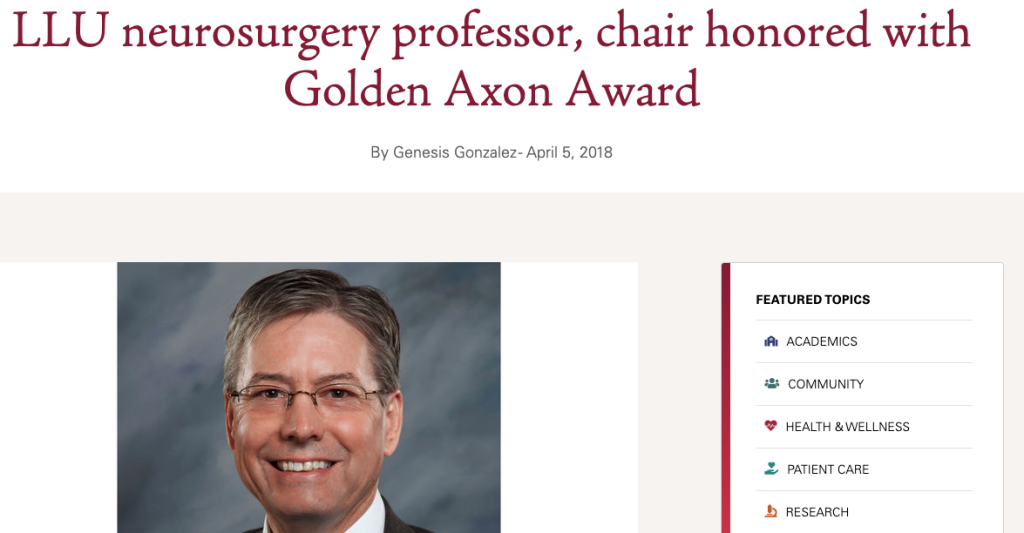
Warren Boling, MD, professor of neurosurgery, chairman of the department of neurosurgery at Loma Linda University Health, has been honored with the 2018 Golden Axon Award, presented by the Society for Brain Mapping & Therapeutics and Brain Mapping Foundation. Each year, the organization awards various pioneers in the field of science, technology and medicine. The Society for Brain Mapping & Therapeutics is a non-profit biomedical association focused on brain mapping and intra-operative surgical planning. According to the society, brain mapping is defined as the study of the anatomy and function of the brain and spinal cord through the use of imaging, immunohistochemistry, molecular and optogenetics, stem cell and cellular biology, engineering, neurophysiology and nanotechnology. The Golden Axon Award was named for the neuron cell fiber that carries outgoing messages to other target cells. The award recognizes a highly regarded individual who helps raise awareness for the SBMT and its mission to serve the community. “The Society for Brain Mapping & Therapeutics is a unique and valuable organization that brings the highest level of scientists, researchers and clinicians together to collaborate and improve the care of our patients with neurological diseases,” Boling said. Boling also proudly serves as the new president of the Society of Brain Mapping & Therapeutics. The Golden Axon Award will be presented to Boling on Saturday, April 14 during the Brain Mapping Foundation Gala at the Millennium Biltmore Hotel in Los Angeles.
LLU neurosurgeons urge congressional caucus to invest in neuroscience technologies
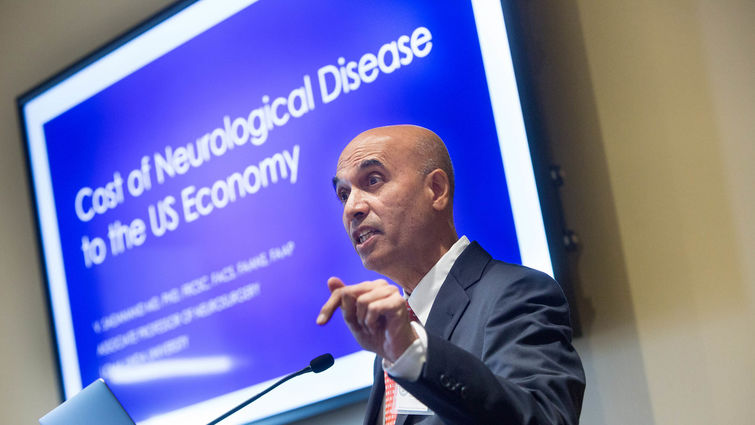
Two Loma Linda University (LLU) neurosurgeons said the economic impact of treating patients with neurological disorders is greater than treating other conditions — such as cancer and cardiovascular diseases — and that more investment in treatment and easing regulations could yield large benefits to both patients and society’s healthcare costs. Venkatraman Sadanand, MD, PhD, associate professor at LLU School of Medicine and attending pediatric neurosurgeon, and Daniel J. DiLorenzo, MD, PhD, MBA, assistant professor at LLU School of Medicine, made their remarks while presenting to the Congressional Neuroscience Caucus yesterday. The two were among six presenters at the 7th Annual Brain Mapping Day, held on Capitol Hill in Washington, D.C. this year in the Rayburn House Office Building. Sadanand and DiLorezno represented Loma Linda University Health during a twenty-minute presentation, highlighting the global burden of neurological disorders and the need to provide patients with the technologies that will help them return to the workforce. According to Sadanand, neurological disorders account for 13 percent of the globe’s economic impact of diseases, while cardiovascular accounts for 3 percent and cancer 10 percent. Sadanand said the annual cost to take care of patients with neurological disorders is approximately $400 billion and is expected to exceed one trillion over the next decade. Sadanand urged the caucus to reexamine how current dollars are allocated and to consider the following: “How do we incentivize our researchers to bring products to our patients?” According to Sadanand, the industry is increasingly working across companies to work collaboratively on discovering treatments for patients and the products they need to combat various diseases. “The problem is we are not able to bring the research to the patient at this time,” Sadanand said. The associate professor purposed the need for innovative approaches to therapeutics, including implementing a Brain Technology and Innovation Park. DiLorenzo approached the topic of neurosciences from an investment angle and the value of investing in new technologies that would reduce costs, increase regulatory efficiencies and improve outcomes for patients living with a neurological disorder. “Not only is it good for people, but good for the system because it’s the fiscally responsible thing to do,” DiLorenzo said. Among all other disorders, neurological disorders — including dementia, epilepsy, stroke and Parkinson’s disease — likely have the highest impact on the quality of life for patients and return on investment for treatment, DiLorenzo said. The goal is to take individuals with neurological disorders and return them back to work, while contributing to the system. “It’s a multi-dimensional return on investment, and that’s a common theme among neurological disorders,” DiLorenzo said. This was the first time both Sadanand and DiLorenzo attended the Annual Brain Mapping Day. Throughout the event, the two met with various representatives to continue the conversation on neuroscience technologies. Both professors plan to maintain contact with members of the caucus and continue to educate and lead theway in new research and technologies for improving neurological disorders.
Global unity and alliance Brain Mapping and Therapeutics will be achieved in Germany during the G20 Summit at 4th Annual G20 BRAIN Initiative/Neuroscience-20 summit
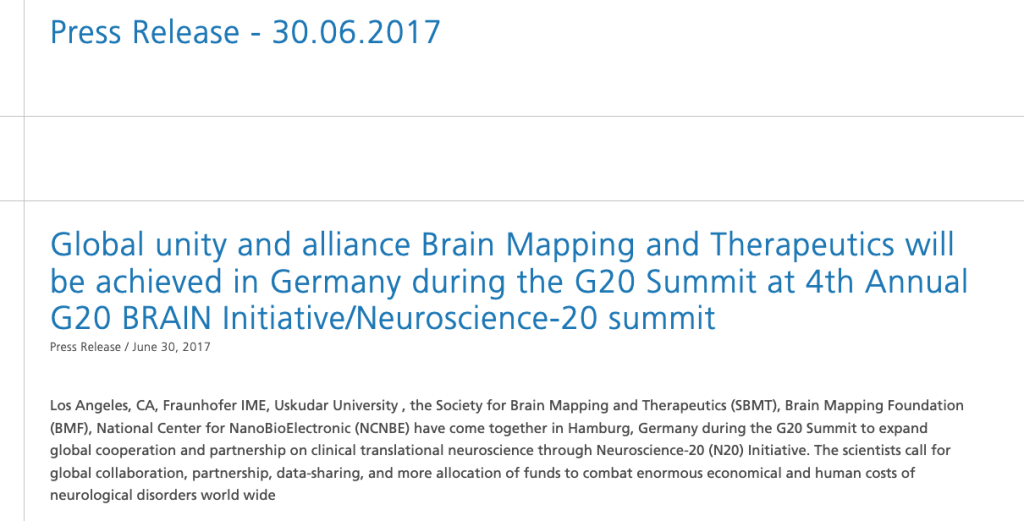
Los Angeles, CA, Fraunhofer IME, Uskudar University , the Society for Brain Mapping and Therapeutics (SBMT), Brain Mapping Foundation (BMF), National Center for NanoBioElectronic (NCNBE) have come together in Hamburg, Germany during the G20 Summit to expand global cooperation and partnership on clinical translational neuroscience through Neuroscience-20 (N20) Initiative. The scientists call for global collaboration, partnership, data-sharing, and more allocation of funds to combat enormous economical and human costs of neurological disorders world wide “Neuroscience-20 Initiative of SBMT is a truly impressive approach toward building global consortia of Brain Initiatives in order to create a united front for tackling devastating neuro-psychiatric disorders worldwide,” said Professor Carsten Claussen, Director of the Fraunhofer Institute for Molecular Biology and Applied Ecology IME, division ScreeningPort in Hamburg, a member of SBMT and Vice-Chairman of the 4th Annual N20 in Hamburg Germany. On July 5th 2017, world’s leading physicians, engineers, neurosurgeons, basic and clinical scientists are gathering at the 4th Annual N20 at the Empire Riverside Hotel, Hamburg, Germany. “Uskudar University is truly honored to jointly sponsor this remarkable gathering of global thought-leaders in Germany; we are looking forward to building multilateral partnership with scientists worldwide through N20” Said Professor Nevzat Tarhan, President of Uskudar University, President of SBMT-Turkey and Vice-Chairman of the N20. The 4th annual N20 program covers all aspects of brain mapping and therapeutics from imaging, connectomics, mathematical modeling, and artificial intelligence to nanoneuroscience, neurophotonics and genomics. The program is aimed at exchanging scientific progress across disciplines of science and technology, which could enable scientists to rapidly introduce new diagnostics and therapeutics. “The human and financial cost of the neurological disorders to the world is enormous; the cost of care of near 5.5 million Alzheimer’s patients in the US alone is now close to $200 billion annually; this cost will be closer to $1 trillion in 10 years,” said Dr. Babak Kateb, Founding Chairman of the Board and Scientific Director of SBMT, President of BMF, Director of NCNBE and Director of Brain Technology and Innovation Park (BTIP), “in 2015, the cost of dementia to the world economy was $818 million which corresponds to the care for near 46.8 million patients; in 2030, this cost will be $2 trillion for dementia alone; this means if dementia was a country, it would be number 18 on the Gross Domestic Product (GDP)”. SBMT has been on the forefront of establishing global Brain Initiatives in the last 15 years and was a key player in formulating and supporting Obama’s BRAIN Initiative. Scientific delegations across the G20 will be attending the symposium; the registration for N20 summit will be closed on July 4th 2017. For more details about the program, you can contact Vice President of Brain Mapping Foundation, Ret. Navy Commander Dr. Ken Green at Ken.Green@WorldBrainMapping.Org
Global unity and alliance in Brain Mapping and Therapeutics will be achieved in Germany during the G20 Summit at 4th Annual G20 BRAIN Initiative/Neuroscience-20 symposium
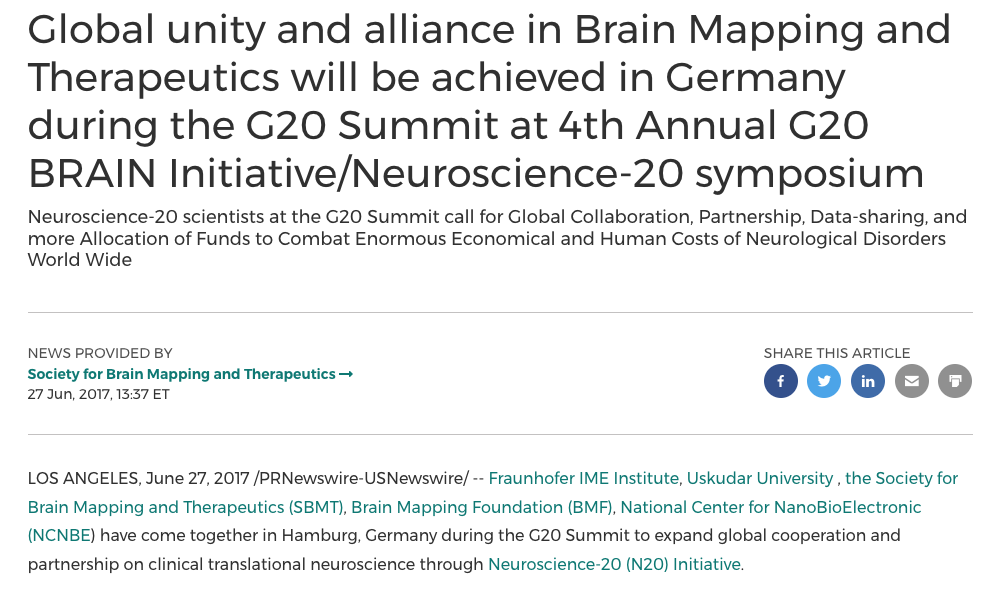
LOS ANGELES, June 27, 2017 /PRNewswire-USNewswire/ — Fraunhofer IME Institute, Uskudar University , the Society for Brain Mapping and Therapeutics (SBMT), Brain Mapping Foundation (BMF), National Center for NanoBioElectronic (NCNBE) have come together in Hamburg, Germany during the G20 Summit to expand global cooperation and partnership on clinical translational neuroscience through Neuroscience-20 (N20) Initiative. “Neuroscience-20 Initiative of SBMT is truly impressive approach toward building global consortia of Brain Initiatives in order to create a united front for tackling devastating neuro-psychiatric disorders worldwide,” said Professor Carsten Claussen, Director of Fraunhofer Institute in Hamburg, a member of SBMT and Vice-Chairman of the 4th Annual N20 in Hamburg Germany. On July 5th 2017, world’s leading physicians, engineers, neurosurgeons, basic and clinical scientists are gathering at the 4th Annual N20 at the Empire Riverside Hotel, Hamburg, Germany. “Uskudar University is truly honored to jointly sponsor this remarkable gathering of global thought-leaders in Germany; we are looking forward to building multilateral partnership with scientists worldwide through N20” Said Professor Nevzat Tarhan, President of Uskudar University, President of SBMT-Turkey and Vice-Chairman of the N20. The 4th annual N20 program covers all aspects of brain mapping and therapeutics from imaging, connectomics, mathematical modeling, and artificial intelligence to nanoneuroscience, neurophotonics and genomics. The program is aimed at exchanging scientific progress across disciplines of science and technology, which could enable scientists rapidly introduce new diagnostics and therapeutics. “The human and financial cost of the neurological disorders to the world is enormous; the cost of care of near 5.5 million Alzheimer’s patients in the US alone is now close to $200 billion annually; this cost will be closer to $1 trillion in 10 years.” said, Dr. Babak Kateb, Founding Chairman of the Board and Scientific Director of SBMT, President of BMF, Director of NCNBE and Director of Brain Technology and Innovation Park (BTIP) “in 2015, the cost of dementia to the world economy was $818 million which corresponds to the care for near 46.8 million patients; in 2030, this cost will be $2 trillion for dementia alone; this means if dementia was a country, it would be number 18 on the Gross Domestic Product (GDP)”. SBMT has been on the forefront of establishing global Brain Initiatives in the last 15 years and was a key player in formulating and supporting Obama’s BRAIN Initiative. Scientific delegations across the G20 will be attending the symposium; the registration for N20 summit will be closed on July 4th 2017. For more details about the program, you can contact Vice President of Brain Mapping Foundation, Ret. Navy Commander Dr. Ken Green at Ken.Green@WorldBrainMapping.Org USA Media Contact:Dr. Ken GreenKen.Green@WorldBrainMapping.Org 202 577-5105 Turkish Media Contact:Öznur Özcan Yıldırımoznur.ozcanyildirim@uskudareurope.com +491746001979 German Media Contact:Dr. Mira GraettingerMira.graettinger@ime.fraunhofer.de +49 (40) 303764-270 About SBMT:www.WorldBrainMapping.Org About BMF:www.BrainMappingFoundation.Org About Uskudar University:http://www.uskudar.edu.tr/en About Fraunhofer Institute for Molecular Biology and Applied Ecology IME:https://www.ime.fraunhofer.de/en.html SOURCE Society for Brain Mapping and Therapeutics Related Links http://www.WorldBrainMapping.Org
G20 HAMBURG 2017

4th Annual G20 World Brain Mapping Summit Wednesday July 5th 2017 PROGRAM Symposium ProgramWednesday, July 5th 2017 07:00-08:00 AM Registration and Breakfast-First Floor 08:00-10:00 AM Press and Media coverage 10:00-10:10 AM Carsten Claussen, PhDLocal Organizing Chair of N20, Director Fraunhofer IME ScreeningPort, Professor for Informatics Heinz Nixdorf Institute PaderbornWelcoming Message 10:10-10:20 AM Babak Kateb, M.D.President and Professor of Psychiatry Uskadar University, Istanbul, Turkey; Vice Chairman of Neuroscience-20+, Member of the Board of SBMTTurkish N20+ Initiative (Update) 10:30-10:40 AM Kuldip Sidhu, PhDProfessor of Stem Cell, University of New South Wells (UNSW), Sydney Australia, Vice-Chairman of Neuroscience-20+, Member of the Executive Board of SBMT, Member of the Board of Brain Mapping Foundation USA; President of Brain Mapping Foundation-AustraliaNew frontiers in tackling brain disorders – an Australian perspective for G20/N20 10:40-11:10 AM Coffee Break Scientific Session 1: (Chair: Dr. Carsten Claussen) 11:10-11:20 AM Siawoosh Mohammadi, PhDMedical Center Hamburg-Eppendorf UKE, Center for Experimental MedicineQuantitative MRI and in vivo histology 11:20-11:30 AM Benjamin Schattling, PhDCenter for Molecular Neurobiology Hamburg (ZMNH)Cellular mechanisms of neuronal injury and repair 11:30-11:40 AM Ole Pless, PhDFraunhofer IME ScreeningPort, Head translational science and lab head ZMNHiPs derived neurons as tool for drug discovery 11:40-11:50 AM Christina de Bruyn Kops MScCenter for Bioinformatics University of Hamburg, Research Group for Cheminformatics and Applied Molecular Models.Novel computational approaches for early drug discovery 11:50-12:00 PM Q/A Working Lunch 12:10-12:40 PM Luncheon KeynoteProf. Arne May, MDMedical Center Hamburg-Eppendorf UKE Center for Experimental Medicine, Deputy Director of the Institute of Systems Neuroscience, Head of headache outpatient clinicImaging Migraine from generators to networks Scientific Session 2: (Chair: Dr. Nevzat Tarhan) 1:30-1:40 PM Nevzat Tarhan, MDPresident of Uskadar University, Professor and Chair of Psychiatry, Uskadar University, Istanbul, TurkeyThe future of psychiatric neuroscience 1:40-1:50 PM Baris Metin, MDAssociate Professor of Psychaietry, Uskadar University, Istanbul TurkeyBrainpark, Business Incubator for neurotechnology startups 1:50-2:00 PM Serdar Karagoz, MSc, PhDAdministrative Director, Office of the President, Uskadar University, Istanbul, TurkeyBrain Hospital of the Future concepts 2:00-2:10 PM Kaya Aksoy, MDProfessor of Neurosurgery, Uskadar University, Istanbul, TurkeyNeurosurgical concept in the Brain Hospital 2:10-2:20 PM Q/A 2:20-2:30 PM Break Scientific Session 3: (Chair: Dr. Ken Green) 3:00-4:00 PM Dr. Ken Green, MDVP of Brain Mapping Foundation and Member of the Executive board of SBMT 3:00-3:10 PM Mike Roy, MD, MPHMember of the Board of SBMT, Past President of SBMT, Professor of Internal Medicine, Uniformed Services University Health System (USUHS), Ret. Colonel, United Stated Army, Washington DC, USASingle and Multiple Traumatic Brain Injuries, Posttraumatic Stress Symptoms, and Cognitive Performance in Military Service Members 3:10-3:20 PM Antonio A.F. De Salles, M.D., PhDProfessor Emeritus of Neurosurgery – UCLA, Departments of Neurosurgery and Radiation Oncology, USA, Head HCor Neuroscience, Brazil, President of the Ibero-Latin American Radiosurgery Society, President of the International Stereotactic Radiosurgery Society (ISRS), Vice Chairman of N20/G20 World Brain Mapping Initiative-Brazil, President of SBMT-BrazilNeuromodulation in Depression and Morbid Obesity 3:20 -3:30 PM Babak Kateb, M.D.Neuroscience-20+/G20+ World Brain Mapping Initiative Chairman, Founding Chairman of the Board of SBMT, President of BMF, Scientific Director of California Neurosurgical InstituteNanoBioElectronics: Integrating nanotechnology, stem cell, AI, Imaging and Neurophotonics 3:30-3:40 PM Vicky Yamamoto, PhDCancer Scientist, Department of Head and Neck Surgery, USC-Keck School of Medicine, Member of the Executive Board of SBMT, Member of the Board of Brain Mapping Foundation and Executive Director of SBMT, USACancer Moonshot: Past, Current and the Future state-of-the-science 3:40-3:50 PM TBD 3:50-4:00 PM Q/A 4:00-4:30 PM Break 4:30-5:00 PM Keynote 2Prof. Dr. Martin Hofmann-ApitiusFraunhofer Institute for Algorithms and Scientific Computing SCAI, Head of Bioinformatics. Professor of Applied Life Science University BonnThe modelling of neurodegenerative diseases 5:00-5:10 PM Q/A 5:10-5:20 PM Break 5:20-6:00 PM Roundtable discussion and summit conclusionCo-Chair: Nevzat Tarhan, Babak Kateb, Carsten Claussen, Kuldip Sidhu
Why Nigerian Government Should Invest In Scientific Research – LASU Dons Reveal
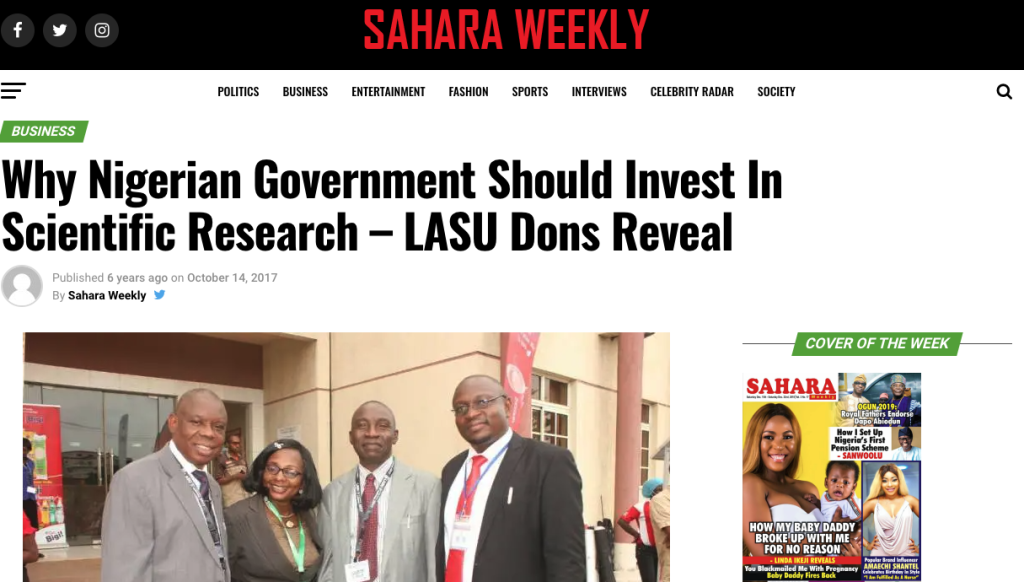
“One of the ways to appreciate scientific research is to imagine a world without Electricity, Computers, Cars, Mobile Phones or Televisions, such a world could be described as a complete desert, he said. “The impact of scientific research is so great to the extent that it is a major determinant of economic viability of a nation, adding that “this has led to the assertion that countries with higher scientific breakthroughs generally have better education, better health and higher life expectancy. This suggests that any country with a clear vision to succeed should be ready to embrace and invest in scientific research. Professor Aribisala said the current situation in Nigeria, most especially in the areas of economic stability, poor quality of education, insecurity, unemployment and political instability call for urgent attention. He, however, expressed dissapointment that little or no consultation has been made to scientific approach of solving these national problems. Speaking with Journalists, on many problems confronting the nation and what Nigerian scientists are doing, Mrs. Adejoke Ibidapo, a professor of Parasitology, said scientific research requires a lot of funding. She also lamented that money that could have been used to fund scientific research for national development were being looted by politicians. According to her, “scientific research has a lot to do with financial backing and we also know what the government is facing concening money right now. Billions and trillions were being spent by individuals instead of channeling them to scientific research. “Some universities have just resumed from strike all because we need better infrastructures. If you go to other universities, even for publishing you are encouraged, you are given something for your effort. “More money should be channelled to national institutes and Universities for better equipment of laboratories that will encourage standard research which is key to national development, Professor Ibidapo said In her submission, Professor Sena Bakre of the department of Microboiology, urged the federal government to increase budget in education and fund tertiary institutions, noting that materials and finance are the major problems affecting research. Also, Professor Adenike Boyo of the department of Physics, who works on Solar energy, said electricity and lack of equipment are some of the challenges affecting standard research in Nigeria. Speaking on how research can contribute significantly to the nation’s GDP, Professor Boyo said, “most of the research works end in the laboratory, noting that ”if there is a database of researches, most of the problems in Nigeria will be solved. The professor of physics further revealed how Nigeria can generate so much revenue from the solar energy she is working on. According to her, when the prototype is tested, replicated in rural areas, the innovation can also be exported to other other countries and this will increase GDP. Earlier, the LOC Chairman, Professor Aribisala said the focus of the 50day Faculty of Science 2017 Conference is to bring academic scholars of our great country Nigeria and those of the leading nations of the world together to discuss the way forward in Nigerians’ national development. We hope to give researchers the platform to showcase their research findings, establish collaborations, develop new research ideas and identify the scientific approach and gateway to Nigeria’s national development noting that the faculty has received about 160 abstract submissions from various scientific disciplines The keynote speech was delivered by Dr. Babak Kateb, Director and CEO of the Society for Brain Mapping and Therapeutics in Los Angeles, USA. via a video conferencing.
Zihin okumak hayal değil!

Beyin haritalama ve görüntüleme, connectomic, matematiksel modelleme ve yapay zekâ nanokorezyase, nörofotonik ve genomik tedavi için terapötik alanlar tüm yönleriyle N20 Zirvesinde ele alındı. Yeni teşhis ve terapileri hızla tanıtmalarını sağlayacak bilim ve teknoloji disiplinlerinde bilimsel ilerleme alışverişinde bulunulduğu zirvede zihin okumanın artık bilimin menzili içinde olduğunu kaydeden Prof. Dr. Nevzat Tarhan, psikiyatride cerrahi döneme dikkat çekti. 2013 yılında ABD Başkanı Barack Obama tarafından beynin sırlarını keşfetmek ve hastalıklarının araştırılıp tedavilerinin geliştirilmesi için başlatılan G20 Beyin Girişimi/Nörobilim Zirvesi’nin 4.’sü 5 Temmuz’da Almanya’nın Hamburg şehrinde gerçekleşti. Zirvede Türkiye’yi geçtiğimiz dönemde olduğu gibi Üsküdar Üniversitesi temsil etti. Üsküdar Üniversitesinin öncülüğünde, Fraunhofer IME Enstitüsü, Beyin Haritalama ve Terapötik Derneği, Beyin Haritalama Derneği ve Nanobiyoelektronik için Ulusal Merkezi işbirliği ile 40 bilim insanının katılımı ile, gerçekleşen zirveden çıkan sonuçlar G20 liderleriyle de paylaşıldı.Zirveye Hamburg Muavin Konsolosu Meral Akbilek Koray, Göç ve Türkiye Uzmanı Dr. Yaşar Aydın, Atlas Global Hamburg Müdürü Orhan Kabaoğlu da davetli arak katıldı. Alzheimer, beyin tümörleri, depresyon, şizofreni hastalıkları ve tedavi yöntemlerinin ele alındığı zirvede beynin çalışma şekli ve bozulan yolların tedavi imkanları da tartışıldı. Hastalıkların tedavisinde DNA analizinin öneminin de vurgulandığı zirvede “Beyin Haritalaması” konusu görüntüleme, matematiksel modelleme gibi yönleriyle ağırlıklı olarak ele alındı. Nörobilimin bugünü ve yarını konuşuldu Nörobilimin şimdiki durumu, geleceği ve yeniliklerin gündeme alındığı zirveye katılan bilim insanları küresel işbirliği, veri paylaşımı ve nörolojik bozuklukların ekonomik ve insani maliyetleri ile mücadeleye yönelik fonların adil dağılımı için de çağrıda bulundu. Zirvede Üsküdar Üniversitesi Rektörü Prof. Dr. Nevzat Tarhan “Psikiyatrik Nörobilimin Geleceği”, NP İSTANBUL Beyin Hastanesinden Prof. Dr. Kaya Aksoy “Beyin Hastanesinde Nörocerrahinin Kavramı”, Üsküdar Üniversitesi Öğretim Üyesi Doç. Dr. Barış Metin “Brain Park, Nöroteknolojik başlangıçlar için İş Kuluçka Merkezi”, NPİSTANBUL Beyin Hastanesi İnsan Kaynakları Direktörü Öğr. Gör. Serdar Karagöz “Beyin Hastanesinin gelecek konsepti” başlıklı sunum yaptı. Hamburg Fraunhofer Enstitüsü Müdürü, SBMT üyesi ve Başkan Vekili Prof. Dr. Carsten Claussen, Beyin Girişimlerinin küresel konsorsiyumlarının oluşturulması ve dünya çapında yıkıcı olan nöro-psikiyatrik bozukluklarla mücadelede bütüncül bir cephe oluşturmak için gerçekten etkileyici bir yaklaşım olduğuna dikkat çekti. Tarhan: Zihin okumak bilimin menzili içinde yer almaya başladı Zirvenin düzenleyicilerinden Üsküdar Üniversitesi Rektörü, SBMT Türkiye Başkanı ve N20 Başkan Yardımcısı Prof. Dr. Nevzat Tarhan, konuşmasında Üsküdar Üniversitesinin Almanya’daki küresel düşünce liderlerinin bu olağanüstü toplantısına sponsorluk ve evsahipliği yapmaktan onur duyduğunu belirterek “N20 vesilesiyle dünya çapında bilim adamları ile çok taraflı ortaklık kurmak için sabırsızlanıyoruz” dedi. Psikiyatride cerrahi dönem! Tarhan zirvede, birçok nörolojik hastalığın cerrahi yöntemlerle tedavilerinin geliştirildiğini belirterek “Depresyon ve birçok hastalığın cerrahi yöntemle tedavileri ilgi çekiyor ve çok önem teşkil ediyor. Bilgi teknolojinin nörobilimle bir arada olduğunu görüyoruz. Artık zihin okumak bilimin menzili içinde yer almaya başladı. Bir insanın düşüncelerinin bilgisayara kaydetmek, bilgisayardaki bilgileri insan zihnine kaydetmeyle ilgili araştırmalar yapılıyor.” dedi. Alzheimer’ın bakım maliyeti 1 trilyon dolar olacak! SBMT Yönetim Kurulu Başkanı ve Bilim Müdürü, BMF Başkanı, NCNBE Direktörü ve Beyin Teknolojisi ve Yenilik Parkı Müdürü (BTIP) Dr. Babak Kateb, “Nörolojik rahatsızlıkların dünyadaki insani ve finansal maliyeti çok fazla. ABD’de sadece 5.5 milyon Alzheimer hastasının bakım maliyeti yılda 200 milyar dolara yakın ve bu maliyet 10 yıl içinde 1 trilyon dolara yakın olacaktır. 2015 senesinde Demansın dünya ekonomisine maliyeti 818 milyon dolar ve 46,8 milyon civarında hastanın bakımına tekabül ediyordu. Bu rakamlar 2030 senesinde demans için 2 trilyon dolar olacak. Demans bir ülke olsaydı Gayri Safi Yurt İçi Hasılatı (GSYİH) üzerinden 18 numara olurdu” dedi. Üsküdar Haber Ajansı (ÜHA)
Dünya’nın Beyin Haritası Hamburg’da çizildi! Bilimkurgu filmleri gerçek oluyor…
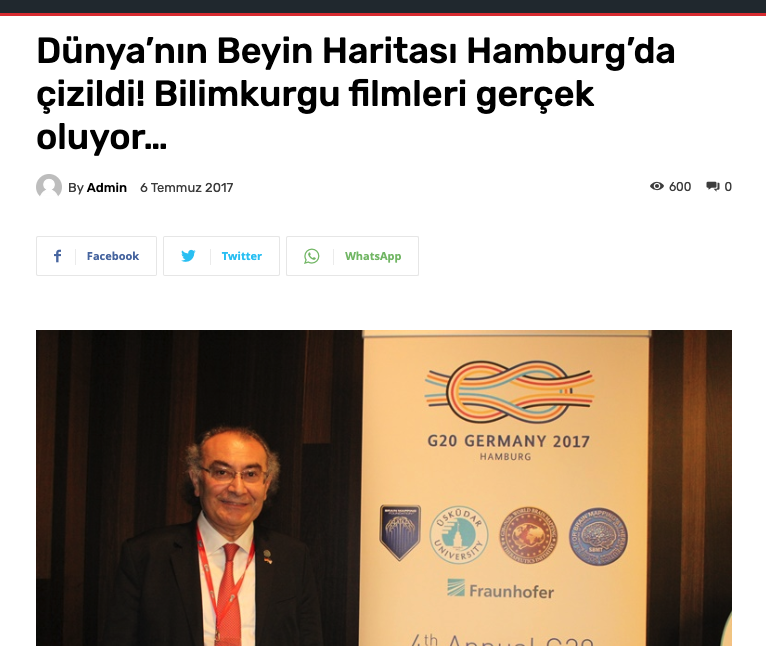
N20 Beyin Girişimi/Nörobilim Zirvesi Hamburg’da gerçekleşti. Zirvede ilerki yıllarda Alzheimer, Şizofreni, Depresyon, Beyin Tümörleri gibi hastalıkların tedavilerindeki çalışmaların yanı sıra gelecekte Nöro bilim ve nano robotlar ile beynin hasarlı kısımlarının tedavi edileceği konuşuldu. ELBE EXPRESS/KENT HABERLERİ FOTO:ELBE EXPRESS 2013 yılında ABD Başkanı Barack Obama tarafından beynin sırlarını keşfetmek ve hastalıklarının araştırılıp tedavilerinin geliştirilmesi için başlatılan Brain Initiative (Beyin Girişimi) Projesi’nin kapsamında Hamburg’da N20 Beyin Girişimi/Nörobilim Zirvesi gerçekleşti. Üsküdar Üniversitesi, Fraunhofer IME Enstitüsü, Beyin Haritalama ve Terapötik Derneği, Beyin Haritalama Derneği ve Nanobiyoelektronik için Ulusal Merkezi’nin ortaklaşa katılımıyla gerçekleşen zirveye yaklaşık 20 bilim insanı katıldı. Liman semtindeki Empire Riverside Hotel’de gerçekleşen toplantıya Hamburg Muavin Konsolos Meral Akbilek Koray, Göç ve Türkiye Uzmanı Dr. Yaşar Aydın, Atlasglobal Hamburg Müdürü Orhan Kabaoğlu’nunda aralarında olduğu çok sayıda davetli katıldı. BİLİM KURGU GERÇEK OLUYOR G20 Zirvesinin uydu toplantısı olan N20 Zirvesinde dünyanın farklı ülkelerinden gelen bilim insanları Nörobilim’in şuanki geleceği ve yenilikleri hakkında konuşmalar yaptılar. Zirvede Alzheimer, Şizofreni, Depresyon, Beyin Tümörleri gibi hastalıkların tedavilerindeki çalışmalar, bu konularda neler yapıldığı ve yeni gelişmeler aktarıldı. Hastalıkların tedavisinde DNA analizi üzerindeki bilgiler aktarıldı. Zirvede beynin nasıl çalıştığı ve bozulan yolların nasıl düzeltileceğine dikkat çekildi. İNSANLAR KONUŞMADAN İLETİŞİM KURABİLECEK Toplantı için Türkiye’den gelen Üsküdar Üniversitesi Rektörü Prof. Dr. Nevzat Tarhan, önemli bilgiler verdi. Tarhan şöyle aktardı: “Beyin arayüzleri yazılmaya ve beyindeki bilgilerin bilgisayara aktarılmasına çalışılıyor. Zirvede beyin ara yüzleri, nero robotların yapılması, insana en yakın el ve ayak protezleri çalışmaları aktarıldı. Bilimin sadece bilim kugu değil araştırma ve uygulama boyutuna gelmiş bilgiler olarak gözüküyor. Nasa ‘da 200 bilim insanı nano robotlar üzerinde çalışıyorlar. Bebek sesi, kuş sesi, insan sesi beyine dinletilip kayıt ediliyor. Daha sonra bu sinyaller beyi ne veriliyor. Ve beyin bu sinyalleri ayırt edebiliyor. Bu çözülünce insanlar artık konuşmadan bir birleriyle iletişim kurabilecekler. Beyindeki bilgiler okunabilecek. Tuşlarla insanı kontrol edemeyeceğiz ama bir aya yüz yazarak insanın beynindeki hasarı tamir edebileceğiz. Bu noktada önümüzdeki 10 yıllar ciddi yeniliklere gebe.”
